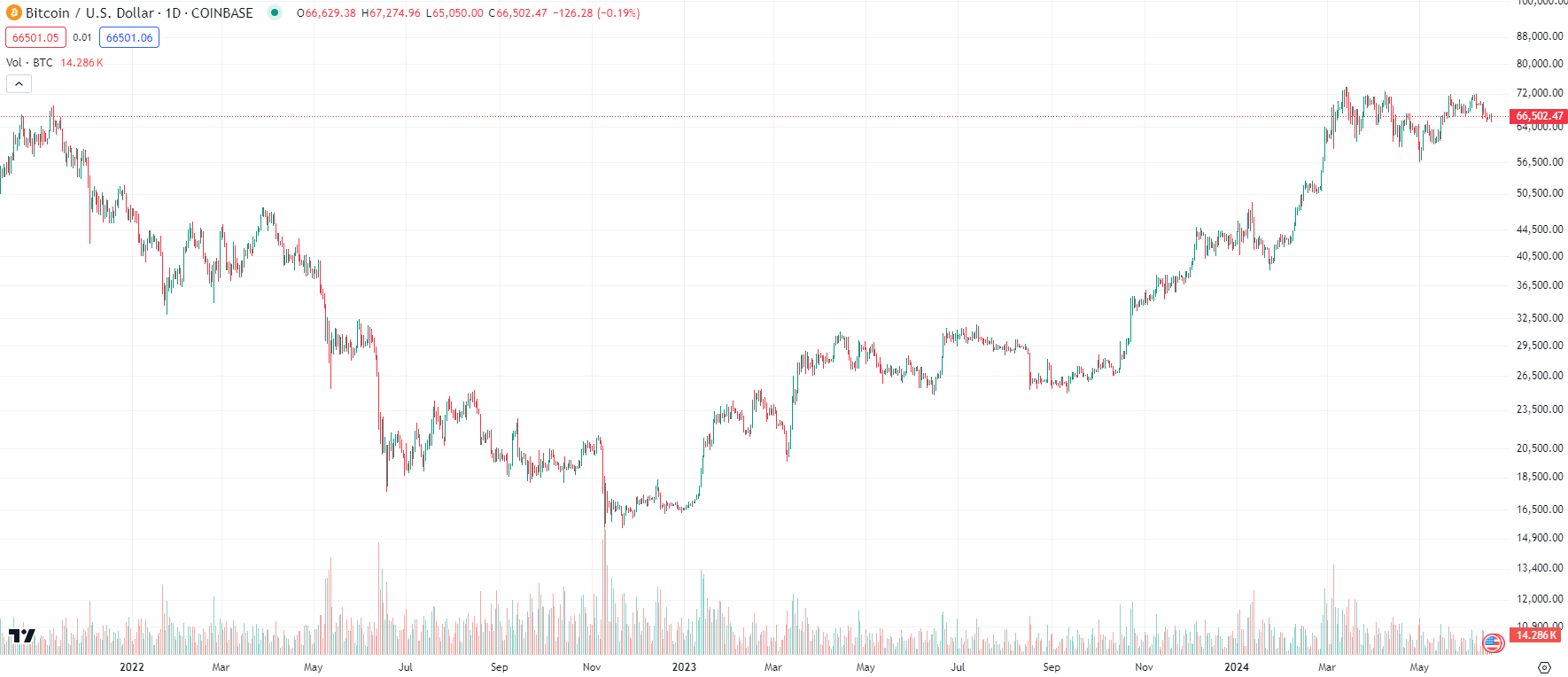The dream of Bitcoin ETFs on the ASX will soon become a reality, but here’s what investors need to know

For a long time, the concept of bitcoin ETFs has been little more than a pipedream, until the SEC finally gave the concept regulatory approval.
Cryptocurrencies have seen a surge in popularity over the past decade, with Bitcoin being the most well-known and dominant player in the market – it is just over half of crypto’s US$2.4tn market capitalisation. Despite its success, there are still many barriers preventing widespread adoption of Bitcoin as a mainstream form of currency. One major hurdle is the lack of regulated investment vehicles for cryptocurrencies was one of them. The approval of bitcoin ETFs was always envisioned as a long way towards overcoming this hurdle. The SEC approved its first at the start of 2024, and our regulators have followed suit. Consequently, the ASX will have its first bitcoin ETF commence trading tomorrow (June 20, 2024).
Bitcoin ETFs…how would they work?
First of all, it is important to recap what ETFs are generally. An Exchange Traded Fund (ETF) is an investment vehicle that tracks the performance of a particular asset or group of assets. It allows investors to buy and sell shares of the ETF, providing them with exposure to the underlying assets without actually owning these underlying assets. This makes it easier for investors to diversify their portfolios and gain access to markets that would otherwise be difficult to enter.
So you could imagine bitcoin ETFs would be a good way to overcome the hurdle of liquidity. Invest in a bitcoin ETF and you would effectively own shares with direct exposure to bitcoin. We’re not talking ownership in companies that invest in bitcoin while still owning the asset itself, like DigitalX (ASX:DCC), or even bitcoin miners. We’re talking investors buying an ETF and having exposure to bitcoin, along with all the upside and downside associated with it. It isn’t quite the same as holding it directly, but it is held via existing financial instruments.
The lack of bitcoin ETFs up till now is almost exclusively because of regulatory concerns. Regulators have been reluctant to approve such a concept for several reasons, most notably the volatile nature of cryptocurrencies and the potential for fraud and manipulation in the market. However, hopes had been growing higher and higher that Bitcoin ETFs could become reality, especially as the market was maturing and becoming more regulated.
A Bitcoin ETF is listing on the ASX
The VanEck Bitcoin ETF is set to commence trading on the ASX on Thursday June 20. This is the first of its kind and it may not be the last if the experience in the US is any guide. It comes less than 6 months after the SEC approved a bitcoin ETF back in January.
It has taken many years to get to this point. And it is important to note that investors in Australia have had the option of investing in bitcoin ETFs through US exchanges, or even Cboe’s rival Australian exchange with funds such as Global X’s 21Shares Bitcoin ETF. In the 12 months to March 31, this fund returned 154%.
So, there is demand for a fund like this, otherwise VanEck would not have tried for so long to get this fund approved.
The SEC approved a Bitcoin ETF in January
The SEC gave the long awaited green light back in January and nine bitcoin ETFs ultimately listed in the US. The largest is iShares Bitcoin Trust that has US$19.5bn in assets as of mid-June 2024. In a statement written by Chair Gary Gensler, the regulator said the approval and listing of the relevant bitcoin ETFs was ‘the most sustainable path forward’, noting things were different from 2018 when the first proposal was disapproved.
At the same time, the SEC noted that it was not endorsing bitcoin, or crypto generally, as an asset class. It even noted that bitcoin was ‘primarily a speculative, volatile asset that is also used for illicit activity, including ransomware, money laundering, sanction evasion and terrorist financing’.
Ultimately, it did give approval and noted this would mean a few things:
- Sponsors of bitcoin ETFs would be required to provide full, fair and truthful disclosure about the products,
- Bitcoin ETFs would be listed and traded on exchanges,
- Existing rules and standards of conduct to purchases and sales.
The SEC also stressed that it was not an endorsement of crypto trading platforms or intermediaries, noting they tend to be non-compliant with federal securities laws and often had conflicts of interest.
Implications
The SEC itself highlighted many of these. One thing it neglected to mention (and we understand why) was that it would open up access to Bitcoin for a wider range of investors, including institutional investors who may have previously been hesitant to enter the market. This influx of new investors could potentially drive up demand and increase the value of Bitcoin.
In addition, the introduction of Bitcoin ETFs will also contribute to the overall mainstream adoption of cryptocurrencies. As more investors gain access to Bitcoin through an ETF, it will become more widely recognised and accepted as a legitimate asset class.
While there is still uncertainty surrounding the future of Bitcoin and other cryptocurrencies, the blessing of regulators in 2024 is show that progress is being made towards a different future to the tortured past it has had.
So, will this mean bitcoin will continue to rise? Possibly, although this is just one of many factors influencing the market. Bitcoin has gained over 300% since bottoming out in January 2023 for a number of reasons, even in absence of ETFs. One could conclude either that a bitcoin ETF would make this asset class perform even better, that it will do well regardless of whether or not there’s an ETF, or that perhaps it has come too late to have an impact to the market.

Bitcoin price in USD, log scale (Source: TradingView)
So should I invest in bitcoin ETFs?
An interesting question. Investors already invested in crypto may find this a more appealing avenue to invest, although of course not if they’ve lost money already. For investors not in crypto, this too will be an easier way, but always be aware that it is a volatile asset class that can cause substantial losses just as easily as substantial gains.
What are the Best shares to invest in right now?
Check our buy/sell tips

Blog Categories
Get the Latest Insider Trades on ASX!
Recent Posts
AML3D (ASX:AL3): Order Book at $16.5m, The Growth Runway Stays Intact
A $150m to $200m Navy Opportunity, But Execution Comes First AML3D has reported its interim half-year results, and while revenue…
Capital Allocation in a Fragmented World, Where Smart Money Is Quietly Moving
Global markets in 2026 feel more fragmented than ever. Inflation has moderated in some regions yet remains sticky in others.…
Nvidia (NASDAQ:NVDA) New Rubin Chip Is Here, A 25% Higher Price, A 10x Better Outcome
Rubin Is Here, The Real Story Is Cost per Token Nvidia has now unveiled its new Vera Rubin chips, and…


